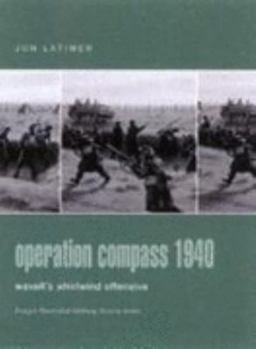Operation Compass 1940: Wavell's Whirlwind Offensive (Praeger Illustrated Military History)
(Part of the Osprey Campaign (#73) Series and Osprey Campaign (#73) Series)
Select Format
Select Condition 
Book Overview
Osprey's Campaign title for the first battle of the desert war, Operation Compass, which was originally envisaged as a spoiling attack, combined with a reconnaissance in force to disrupt the Italian... This description may be from another edition of this product.
Format:Hardcover
Language:English
ISBN:0275982866
ISBN13:9780275982867
Release Date:January 2004
Publisher:Praeger Pub Text
Length:96 Pages
Weight:0.80 lbs.
Dimensions:9.8" x 0.5" x 7.3"
Related Subjects
History Middle East Military Military Science Modern (16th-21st Centuries) World War IICustomer Reviews
2 ratings
Good study of an overlooked campaign
Published by Thriftbooks.com User , 16 years ago
Histories of the North African campaign too often start with the appearance of the Afrika Korps in April 1941. That does a disservice to the British: their victory over the Italians in 1940 was an amazing achievement that deserves more attention. Jon Latimer provides us with just that. Although not up to the standard of some of the more recent Osprey Campaign books, Latimer does a good, solid job. He points out the shortcomings of the Italian army -- the leaders, shortage of modern and effective weaponry, inadequate logistics and poor intelligence -- which negated the courage of the soldiers. By comparison the British were much better off in each of these areas. Latimer follows this up with the actual battles, showing how (despite a smaller force) the British concentrated superior numbers at the point of attack and then exploited victories to the full. The maps do a good job of illustrating the actions, although one showing in detail one of the attacks on the Italian camps at the start of the campaign would have been very useful. The careening pursuit across western Cyrenaica, ending in the decisive battle of Beda Fomm is very ably described and compares with anything Rommel achieved. The main drawback, as mentioned by another reviewer, is analysis. Except for the obligatory comment that the British missed their chance to drive the Italians completely out of North Africa, we are left to draw our own conclusions. There are some interesting ones to draw. The British 7th Armored Division was used strictly to exploit victories achieved by other forces, rather than as a versatile combat unit like the panzer divisions. Organization shortcomings (too many tanks, not enough infantry and supporting arms) were already making themselves felt. At least one tank charge was shot to pieces by Italian artillery, something that would be repeated all too often in 1941-42. Despite this shortcoming, Latimer does an admirable job of covering the first British North African campaign. I would buy this book again in a heartbeat.
Essential title fills a huge gap in history of WW2
Published by Thriftbooks.com User , 19 years ago
There are few books which dare even touch on the desert campaigns of the second world war, and those that do usually slight the role of the British, and that of the Italians. This book gives a great and simple to follow account of the battle which started the whole mess in North Africa, the battle that started the domino effect that would lead to every major power, axis and allies, pouring all their resources into what was ultimately useless territory. The only thing I felt the book lacked was background as to why Italy sought to invade Egypt, and why Britain was so woefully unprepared to meet the attack. There also isnt a lot of perspective as to what else was going on during this campaign, such as the Italian invasion of Somalia, Kenya, Greece, Yugoslavia, etc. But as a study of the campaign itself, this book offers a great description of an important but overshadowed group of battles.






